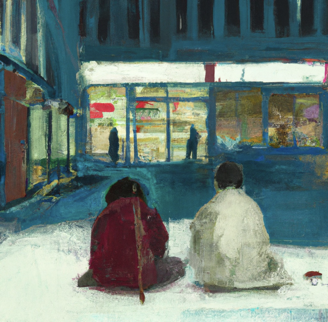Summary:
In this conversation, Fiona and I navigate the challenges faced by neurodivergent and gifted people in traditional education. In this expansive exploration, Fiona provides valuable insights into neurodivergence, giftedness, and the interplay of intensity and empathy. This conversation aims to help in understanding and supporting diverse minds, with a particular emphasis on understanding gifted children in a world that sometimes struggles to grasp the depth and breadth of cognitive and emotional diversity.
About Fiona:
Fiona Smith is the Director of the Gifted Minds practice. She has a Bachelor of Arts Degree with Honours in Psychology and a Masters Degree of Education, majoring in Gifted Education. She also has full registration with the Psychology Board of Australia and Full Membership of the Australian Psychological Society. Fiona’s qualifications make her unique in the field, as she combines degrees in Psychology and Education, while specialising in gifted education.
Where to find Fiona: https://giftedminds.com.au
***
To start our exploration, we delved into Fiona’s background, encouraging her to share insights from her 25-year journey as a psychologist specializing in neurodivergence, particularly giftedness. Fiona, with the unique perspective derived from both professional expertise and personal experience as a parent of an intensely gifted daughter, seamlessly navigated our discussion between her extensive career and the nuanced experiences of neurodivergent individuals.
Fiona introduces the concept of positive intensity, classifying almost everyone she works with, including family and friends, as extremely intense.
Later in our conversation, Fiona opens up about her own intensity, shaped by Aphantasia, a condition inhibiting the visualization of mental images. Fiona’s image-free thinking adds another layer of complexity to her intensity, offering a unique understanding of gifted children’s experiences as she navigates the world.
Aphantasia, demystified by Fiona, affects about 2% of the population with varying intensity levels. The discussion reveals its impact on thinking processes, influencing how individuals learn and perceive the world.
Fiona sheds light on the challenges neurodivergent and gifted children face in traditional education settings, often misdiagnosed and underserved. An example of a child thriving after unschooling, following misdiagnosis with ADHD and ASD, underscores the need for a nuanced approach to education. This example emphasizes the significance of understanding gifted children in educational contexts.
Recognizing the brilliance of neurodivergent students, often obscured by conventional assessments, is crucial, Fiona argues. She advocates for a shift in educational paradigms, urging teachers to appreciate unconventional thinkers and foster environments that nurture diverse talents.
The conversation extends to conventional and unconventional giftedness, emphasizing the importance of supporting both. Fiona exposes the pitfalls of the existing system and calls for personalized support to prevent unconventional thinkers from feeling inadequate. This personalized approach is integral to addressing gifted children and young people’s unique needs.
Challenges faced by gifted children later in life due to a lack of exposure to failure are discussed, emphasizing the importance of teaching resilience, risk-taking, and embracing failure for personal growth. This is about understanding gifted children’s emotional development and the impact of their experiences on their journey.
Fiona, drawing from her experiences as a therapist in schools, highlights the limitations faced by teachers dealing with larger groups of gifted children. She dispels outdated stereotypes and notes the changing perception of gender differences in abilities and societal acceptance of diverse thinking styles. She includes examples of a homeschooled child and a girl excelling academically with the right support, underlining the need for personalized approaches to cater to diverse needs within the same family.
Fiona’s advice revolves around trusting instincts, recognizing early signs, and seeking further understanding. Assessments, including those from organizations like MENSA or private psychologists, are explored. Fiona stresses the complexity of defining giftedness solely through IQ assessments, advocating for a holistic approach that considers individual needs and interests. This holistic perspective helps us understand gifted children in a comprehensive manner.
We discuss how a gifted person navigates challenges of physical sensitivities in a bustling world. Fiona shares insights on addressing sensory challenges, highlighting practical solutions like specialized clothing.
The conversation touches on Fiona’s ‘intense empathy,’ often accompanying overexcitabilities. Fiona’s pragmatic approach emphasizes not cornering individuals and focuses on choices and negotiation. We delve into Fiona’s evolving understanding of empathy, highlighting her unique visceral response during one-on-one interactions.
The prevalence of intense empathy among gifted individuals is explored, along with Fiona’s evolving understanding of empathy, conceptual empathy, and moral reasoning. Gifted individuals may exhibit a heightened interest in complex concepts from an early age. Understanding gifted children’s emotional intelligence and moral development becomes integral to this part of our discussion.
We discuss Fiona’s paper on the challenges of absorbing others’ energy, emphasizing the potential impact on therapists who are energetically porous. Fiona acknowledges the physiological response, explaining how her blood pressure rises after intense interactions. The importance of self-awareness, acceptance, and planning ahead to manage social interactions effectively is highlighted.
In this expansive exploration, Fiona provides valuable insights into neurodivergence, giftedness, and the interplay of intensity and empathy. This conversation aims to help in understanding and supporting diverse minds, with a particular emphasis on understanding gifted children in a world that sometimes struggles to grasp the depth and breadth of cognitive and emotional diversity.
Imi Lo is an independent consultant who has dedicated her career to helping emotionally intense and highly sensitive people turn their depth into strength. Her three books, Emotional Sensitivity and Intensity, The Gift of Intensity, and The Gift of Empathy, are translated into multiple languages.
Imi holds three master's degrees in Mental Health, Buddhist Studies, and Global Cultures, alongside training in philosophical counseling, Jungian psychology, and other modalities. Her multicultural perspective has been enriched by living and working across the UK, Australia, and Asia, including with organizations such as Médecins Sans Frontières/Doctors Without Borders and the NHS (UK). Throughout her career, she has served as a psychotherapist, art therapist, suicide crisis social worker, mental health supervisor, and trainer for mental health professionals.
You can contact Imi for a one-to-one consulting session tailored to your specific needs.

